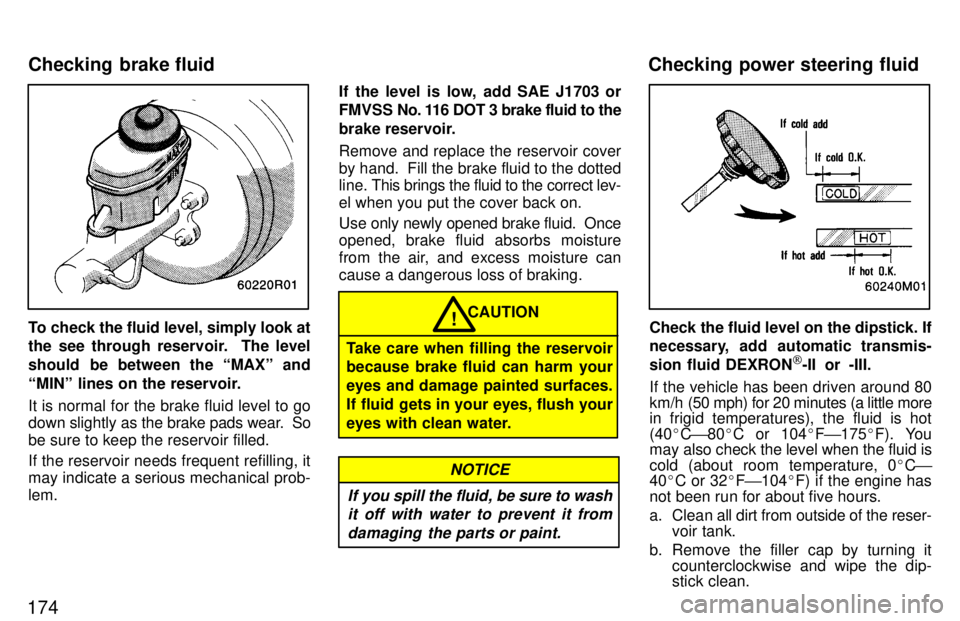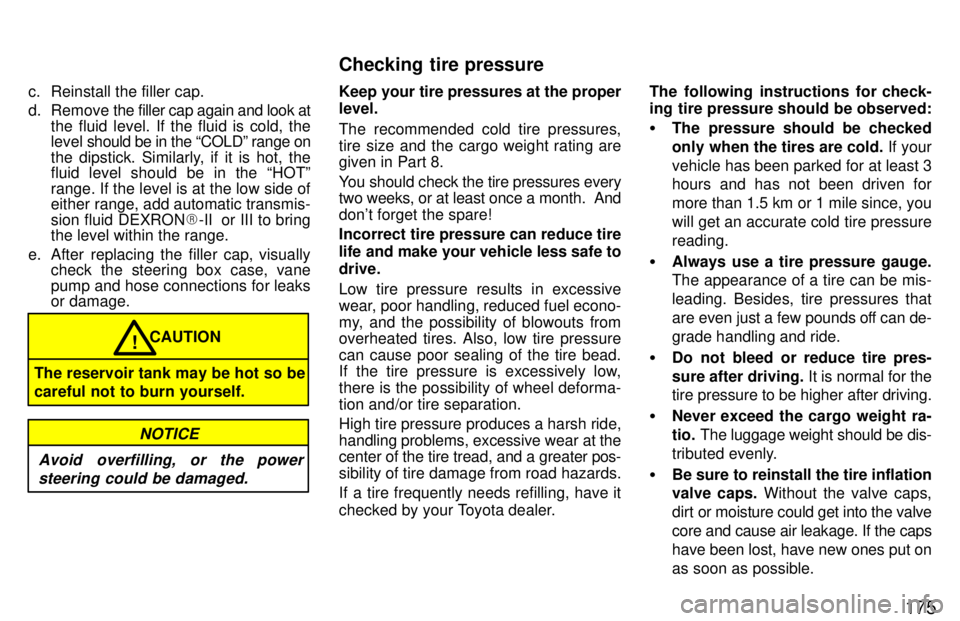1997 TOYOTA T100 power steering fluid
[x] Cancel search: power steering fluidPage 164 of 212

160Engine coolant level Make sure the coolant level is between
the FULLº and LOWº lines on the see-
through
reservoir when the engine is cold.
See Chapter 7-2 for additional informa-tion when the engine is cold. Battery electrolyte level Make sure the electrolyte level of all bat-
tery cells is between upper and lower level
lines on the case. Add only distilled water
when replenishing. See Chapter 7-3 for
additional information. Brake fluid level
Make sure the brake fluid level is correct. See Chapter 7-2 for additional informa- tion.
Engine oil level
Check the l evel on the dipstick with the en-
gine turned off and the vehicle parked on
a level spot. See Chapter 7-2 for addition-
al information. Power steering fluid level Check the level on the dipstick. The level
should be in the HOTº or COLDº range
depending on the fluid temperature. See Chapter 7-2 for additional information. Exhaust system
If you notice any change in the sound of
the exhaust or smell exhaust fumes, havethe cause located and corrected immedi-
ately. (See engine exhaust cautions in
Part 2.)
Be on the alert for changes in perfor-
mance, sounds, and visual tip-offs
that in-
dicate service is needed. Some important
clues are as follows: � Engine missing, stumbling, or pinging
� Appreciable loss of power
� Strange engine noises
� A leak under the vehicle (however, wa-
ter dripping from the air conditioning
after use is normal.)
� Change in exhaust sound (This may
indicate a dangerous carbon monox-
ide leak. Drive with the windows open
and have the exhaust system checked
immediately.)
� Flat-looking tire; excessive tire squeal
when cornering; uneven tire wear
� Vehicle pulls to one side when driving straight on a level road
� Strange noises related to suspensionmovement
� Loss of brake effectiveness; spongy
feeling brake or clutch pedal; pedal al-
most touches floor; vehicle pulls to one
side when braking
� Engine coolant temperature continual-
ly higher than normal
Does your vehicle need repairing?
Page 172 of 212

168�
Be careful not to scratch the glass
surface with the wiper frame.
�When closing the engine hood,
check to see that you have not for-
gotten any tools, rags, etc.
Here is a list of parts and tools you will
need on performing do-it-yourself main-
tenance. Rememver all Toyota parts are
designed in metric sizes, so your tools
must be metric. Checking the engine oil level Parts (if level is low): � Engine oil API SH, Energy-Conserv-
ing IIº multigrade or ILSAC multigrade
having viscosity proper for your cli- mate
Tools: � Rag or paper towel
� Funnel (only for adding oil)
Checking the engine coolant level Parts (if level is low): � Ethylene-glycol antifreeze
� Demineralized or distilled water
Tools: � Funnel (only for adding coolant)
Checking brake fluid Parts (if level is low): � SAE J1703 or FMVSS No. 116 DOT 3 brake fluid
Tools: � Rag or paper towel
� Funnel (only for adding fluid) Checking power steering fluid Parts (if level is low): �
Automatic transmission fluid DEX- RON [
II or III
Tools: � Rag or paper towel
� Funnel (only for adding fluid)
Checking battery condition Non-maintenance batteriesÐ
Tools: � Warm water
� Baking soda
� Grease
� Conventional wrench (for terminal clamp bolts)
Maintenance type batteriesÐ Parts (if level is low): � Distilled water
Tools: � Warm water
� Baking soda
� Grease
� Conventional wrench (for terminal clamp bolts)
� Coin (for vent plugs)
Parts and tools
Page 175 of 212

Part 7Checking the engine oil level
171
DO-IT-YOURSELF MAINTENANCEÐ
Chapter 7-2 Engine and Chassis �
Checking the engine oil level
�Checking the engine coolant level
�Checking brake fluid
�Checking power steering fluid
�Checking tire pressure
�Checking and replacing tires
�Rotating tires
�Installing snow tires and chains
�Replacing wheels
�Aluminum wheel precautions
With the engine at operating tempera- ture and turned off, check the oil level
on the dipstick.
1. To get a true reading, the vehicle
should be on a level spot. After turning
off the engine, wait a few minutes for
the oil to drain back into the bottom of the engine.
2. Pull out the dipstick, and wipe it clean with a rag.
3. Reinsert the dipstick 'push it in as far
as it will go, or the reading will not be correct.
4. Pull the dipstick out and look at the oil level on the end.
CAUTION
Be careful not to touch the hot ex-
haust manifold.!
If the oil level is below or only slightly
above the low level line, add engine oil
of the same type as already in the en- gine. Remove the oil filter cap and add engine oil in small quantities at a time, checkingthe dipstick.
The approximate quantity of oil needed to
fill between the low level line and the full
level on the dipstick is indicated below for reference. When the level reaches within the correct range, install the filler cap hand-tight.
Oil quantity, L (qt., Imp. qt.):
3RZ-FE engine 1.5 (1.6, 1.3) 5VZ-FE engineTwo-wheel drive models 1.5 (1.6, 1.3)
Four-wheel drive models 1.4 (1.5, 1.2)
Page 178 of 212

174
To check the fluid level, simply look at
the see through reservoir. The level
should be between the MAXº and
MINº lines on the reservoir. It is normal for the brake fluid level to go
down slightly as the brake pads wear. So
be sure to keep the reservoir filled. If the reservoir needs frequent refilling, it may indicate a serious mechanical prob- lem. If the level is low, add SAE J1703 or
FMVSS No. 116 DOT 3 brake fluid to the
brake reservoir. Remove and replace the reservoir cover by hand. Fill the brake fluid to the dotted
line.
This brings the fluid to the correct lev-
el when you put the cover back on.
Use only newly opened brake fluid. Once
opened, brake fluid absorbs moisture
from the air, and excess moisture cancause a dangerous loss of braking.CAUTION
Take care when filling the reservoir
because brake fluid can harm your
eyes and damage painted surfaces.
If fluid gets in your eyes, flush your
eyes with clean water.!
If you spill the fluid, be sure to wash it off with water to prevent it from
damaging the parts or paint.
NOTICE
Check the fluid level on the dipstick. If
necessary, add automatic transmis-
sion fluid DEXRON [
-II or -III.
If the vehicle has been driven around 80
km/h (50 mph) for 20 minutes (a little more
in frigid temperatures), the fluid is hot (40 �C ' 80 �C or 104 �F ' 175 �F). You
may also check the level when the fluid is
cold (about room temperature, 0 �C '
40 �C or 32 �F ' 104 �F) if the engine has
not been run for about five hours.
a. Clean all dirt from outside of the reser-
voir tank.
b. Remove the filler cap by turning it counterclockwise and wipe the dip-
stick clean.
Checking brake fluid
Checking power steering fluid
Page 179 of 212

175
c. Reinstall the filler cap.
d. Remove
the filler cap again and look at
the fluid level. If the fluid is cold, the
level should be in the COLDº range on
the dipstick. Similarly, if it is hot, the
fluid level should be in the HOTº range. If the level is at the low side of either range, add automatic transmis-
sion fluid DEXRON �-II or III to bring
the level within the range.
e. After replacing the filler cap, visually check the steering box case, vane
pump and hose connections for leaks or damage.
CAUTION
The reservoir tank may be hot so be careful not to burn yourself.!
Avoid overfilling, or the power steering could be damaged.
NOTICE
Keep your tire pressures at the proper level.
The recommended cold tire pressures,
tire size and the cargo weight rating are
given in Part 8.
You should check the tire pressures every two weeks, or at least once a month. And
don't forget the spare!
Incorrect tire pressure can reduce tire
life and make your vehicle less safe todrive.
Low tire pressure results in excessive
wear, poor handling, reduced fuel econo-
my, and the possibility of blowouts from overheated tires. Also, low tire pressure
can cause poor sealing of the tire bead.
If the tire pressure is excessively low,
there is the possibility of wheel deforma-tion and/or tire separation.
High tire pressure produces a harsh ride,
handling problems, excessive wear at the center of the tire tread, and a greater pos-
sibility of tire damage from road hazards.
If a tire frequently needs refilling, have it
checked by your Toyota dealer. The following instructions for check-
ing tire pressure should be observed: �
The pressure should be checked
only when the tires are cold. If your
vehicle has been parked for at least 3 hours and has not been driven for more than 1.5 km or 1 mile since, you
will get an accurate cold tire pressurereading.
� Always use a tire pressure gauge.
The appearance of a tire can be mis-
leading. Besides, tire pressures that
are even just a few pounds off can de-
grade handling and ride.
� Do not bleed or reduce tire pres-sure after driving. It is normal for the
tire pressure to be higher after driving.
� Never exceed the cargo weight ra-tio. The luggage weight should be dis-
tributed evenly.
� Be sure to reinstall the tire inflation
valve caps. Without the valve caps,
dirt or moisture could get into the valve
core and cause air leakage. If the caps have been lost, have new ones put onas soon as possible.
Checking tire pressure
Page 201 of 212

197
Oil type:
Multipurpose gear oil API GL-4 or GL-5
Recommended oil viscosity: SAE 75W-90
AUTOMATIC TRANSMISSION Fluid capacity (drain and refill), L (qt., Imp. qt.):
Two-wheel drive models Up to 1.6 (1.7, 1.4)
Four-wheel drive models Up to 2.0 (2.1, 1.8)
Fluid type: Automatic transmission fluid D-II or DEXRON [
III (DEXRON [
II)
TRANSFER
Oil capacity, L (qt., lmp. qt.):
1.1 (1.2, 1.0)
Oil type:
Multipurpose gear oil API GL-4 or GL-5
Recommended oil viscosity: SAE 75W-90
DIFFERENTIAL
Oil capacity, L (qt., lmp. qt.): Two-wheel drive models
2.75 (2.9, 2.4)
Four-wheel drive models Front 1.9 (2.0, 1.7)
Rear 2.95 (3.1, 2.6) Oil type:
Hypoid gear oil API GL-5
Recommended oil viscosity: Front
SAE 75W-90
Rear Above -18 �C (0 �F)
SAE 90
Below -18 �C (0 �F)
SAE 80W or 80W-90
CHASSIS LUBRICATION Wheel bearings:
Lithium base wheel bearing grease, NLGI No. 2
Front drive shaft thrust bushings: Synthetic oil and lithium soap basechassis grease, NLGI No. 1
Propeller shafts: Spiders and slide yokes
Lithium base chassis grease,NLGI No. 2
Double cardan joint Molybdenum-disulfide lithium basechassis grease, NLGI No. 2
BRAKES Minimum pedal clearance when de- pressed with the pressure of 490 N (50
kgf, 110 lbf) with the engine running, mm (in.): Two-wheel drive models
1-ton models 78 (3.1)
1/2-ton models 73 (2.9)
Four-wheel drive models
1-ton models 70 (2.8)
1/2-ton models 73 (2.9)
Pedal freeplay, mm (in.):
3' 6 (0.12 '0.24)
Pad wear limit, mm (in.):
1.0 (0.04)
Lining wear limit, mm (in.):
1.0 (0.04)
Parking brake adjustment when pulled with the force of 196 N (20 kgf, 44 lbf): 11'17 clicks
Fluid type:
SAE J1703 or FMVSS No. 116 DOT 3
STEERING Wheel freeplay:
Less than 30 mm (1.2 in.)
Power steering fluid type:
Automatic transmission fluid DEXRON [
II or III